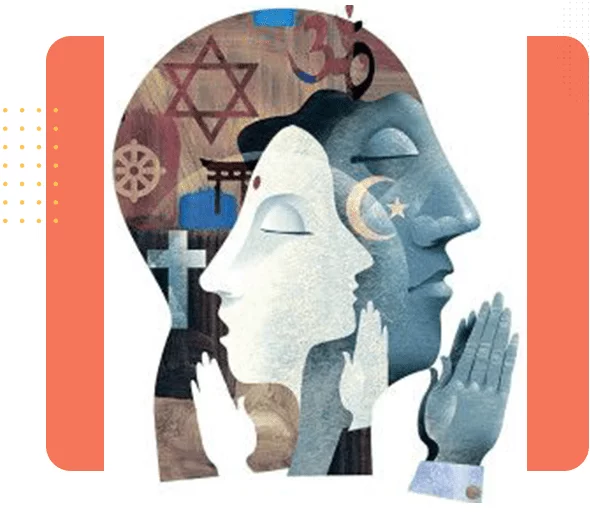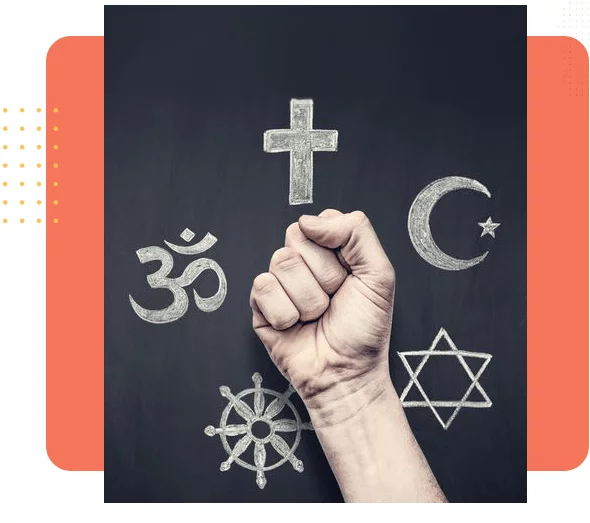Imagine if everyone were just like you. Life would be so boring! Just as there are countless different flowers on planet earth, there are different people. Different flowers have different colors and aromas, just as different people have different biometrics. Pluralism is not about sameness and equivalence; it is about equal respect and dignity among diversity.
Religions across time and place have attempted to advance these same messages. There is nothing contradictory about having deep faith rooted in one particular religious tradition while still acknowledging the truth and value in others.
I was born in Old Delhi, which remains one of the most religiously pluralistic places in the world. As a child, I was exposed to the living traditions of many religions. In our family temple we had the picture of Prophets from all religions, along with a copy of the Holy Qur’an, since the Prophet of Islam, Muhammad, cannot be depicted visually. My dad would read from various scriptures and say that God has incarnated as Krishna, Christ, Mohammed, Buddha, and so on. He would quote the Rig Veda (1.64.46): “Ekam sat vipra bahuda vadanti” (truth is one, but called differently by many).
Hindus depict God in the form of a vast pantheon of beings (“gods”) with both humanlike and animal-like qualities that each represent different ways in which God is manifested throughout the universe. This allows each Hindu to form their own personal connection to God based on each person’s subjective preference for one or more of these representations over others. Because we are all different, we all imagine God in different ways, and Hindus are very conscious of this fact in their worship.
The particular conception of God that each person chooses to implement in pursuing this shared goal of seeking connection with God is akin to one liking the color yellow or the other liking green. The god or goddess you choose to focus on, like a color, is simply a personal choice that doesn’t indicate any kind of superiority or inferiority in belief or worship. Others will not judge or hate you based on such differences. What matters is the intention and practice itself.
The other religions of India were founded on similarly pluralistic values. Buddhism opposes exclusivism, recognizing that there are many paths up the same mountain, with the Buddha expressing only one formulation of the journey toward enlightenment. And the Indian emperor Ashoka, who famously converted to and helped spread Buddhism, turned those principles of religious tolerance and pluralism into sociopolitical laws.
Muslims are commanded to extend a special degree of respect toward Jews and Christians, ‘People of the Book’, who share many of the same prophets, beliefs, and scriptural stories. The Qur’an also encourages Muslims to extend this kind of respect even toward those religions which are not as closely familiar. And pluralism is especially emphasized in Sufism, the mystical sect of Islam which embraces and synthesizes the beliefs and practices of many religions.

Baha’i and Judaism constitute a tiny minority of the total religious population of the world, but both claim a truly global distribution, and a great variety of cultural expressions of the faith. For example, across India there are synagogues whose communities speak the local language and have adapted their rituals. The Baha’i firmly believe that all prophets and all religions come to us from the same God, and that the world is one global family.
Historically, the Christian tradition’s focus on proselytizing constituted a barrier to pluralism, but over time that has shifted. Sects like Universalism and Unitarianism affirm the truth and validity of all religions, The Church of Jesus Christ of Latter (Mormonism) teaches as one of its core principles that there is truth in all religions, and even Catholicism and Eastern orthodox Christianity—which traditionally have taught that salvation only comes through the Church—have found more room for respecting other religions, moving away from total exclusivism.
How senseless it is for there to still be religiously motivated violence in the world! Religious traditions, and subsects therein, have so much more in common than the comparatively minor differences and there is no reason we cannot all be allies in our searches for meaning and truth.
All human progress—scientific, social, and otherwise—has come through the cooperation between diverse individuals. Everyone is born into different circumstances and we all pursue different courses in life which determine what we experience, what we learn, and the unique insights we are able to share with others.
Diversity is a necessary and beautiful part of all biological life. Evolution depends on and is driven by variations preserved through natural selection. Populations and communities of animals without diverse gene pools do not last long because organisms are more well-suited for survival if they have a mix of genes that perform different functions; this is why inbreeding results in so many health problems for offspring. Human society functions along similar lines: a society composed entirely of farmers or entirely of lawyers or any other single profession would not last long because many key features of society would be missing.
We should see diversity not as a source of conflict and division, but as an expression of human love with its diverse manifestations in temples, churches, and universities (our greatest temples of human knowledge) all over the world.
This expression of love is where the true value of religion is to be gleaned. We are of course all unique but in a complementary way rather than a competitive way. If we all respected and embraced plurality and one another’s differences, then humanity could realize its collective potential.
Christianity
“In our time, when day by day mankind is being drawn closer together, and the ties between different peoples are becoming stronger, the Church examines more closely her relationship to non-Christian religions […] The Catholic Church rejects nothing that is true and holy in these religions. She regards with sincere reverence those ways of conduct and of life, those precepts and teachings which, though differing in many aspects from the ones she holds and sets forth, nonetheless often reflect a ray of that Truth which enlightens all.”
—Pope Paul VI, Christian spiritual leader
Islam
“Therefore, be completely and utterly receptive to all doctrinal forms, for God, Most High, is too All-embracing and Great to be confined within one creed rather than another, for He has said, Wheresoever you turn, there is the face of God, without mentioning any particular direction.”
—Ibn Al ‘Arabi, Muslim scholar and mystic
“[Truth is spoken in] monasteries, churches, Synagogues, and mosques, in which The name of God is commemorated In abundant measure.”
—The Qur’an (22:40), Islamic text
Judaism
“‘And all the host of them’ (Gen. 2 : 1 ). Even those creatures that you may look upon as superfluous in the world, such as flies, fleas, or gnats—they too are part of the entirety of creation. The Holy One effects His purpose through all creatures, even through a frog or a flea.”
—Sefer Ha-Aggadah, collection of Jewish writings
Baha’i
“Unity in diversity stands in contrast to uniformity. It cherishes the natural diversity of temperament and talents among individuals as well as humanity’s variegated experiences, cultures and viewpoints, inasmuch as they contribute to the human family’s progress and well-being. Much like the role played by the gene pool in the biological life of humankind and its environment, the immense wealth of cultural diversity achieved over thousands of years is vital to the development of the human race which is experiencing its collective coming-of-age.”
—Bahá’í International Community
Hinduism
“The seed is put in the ground, and earth and air and water are placed around it. Does the seed become the earth, or the air, or the water? No. It becomes a plant, it develops after the law of its own growth, assimilates the air, the earth and the water, converts them into plant substance, and grows into a plant. Similar is the case with religion. The Christian is not to become a Hindu or a Buddhist, nor a Hindu or a Buddhist to become a Christian. But each must assimilate the spirit of the others and yet preserve his individuality and grow according to his own law of growth.”
—Swami Vivekananda, Hindu monk and philosopher
“Ekam sat vipra bahuda vadanti (truth is one but called differently by many).”
—Rig Veda (I.164.46), Hindu text

Buddhism
“Concord is meritorious, (i.e.) that [different religions] should both hear and obey each other’s morals. For this is the desire of Devanampriya, (viz.) that all sects should be both full of learning and pure in doctrine.”
—Ashoka, Indian emperor and promoter of Buddhism
Daoism
“All things have their place in the universe, whether it is active or passive, moving or not moving. They fulfill their function in the world simply by being what they are. Everything plays a part in the process of creating, nourishing, transforming, and destroying.”
—Lieh-tzu, Daoist text
Sikhism
“There is no Hindu, there is no Muslim”
—Guru Nanak, Sikh prophet
Modern Philosophy and Theology
“We should feel enlarged by the people who are different.”
—Rabbi Jonathan Sacks, Jewish philosopher and theologian


